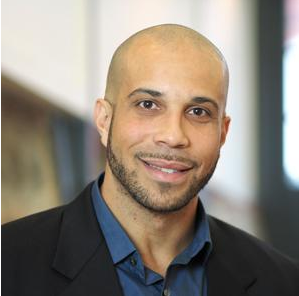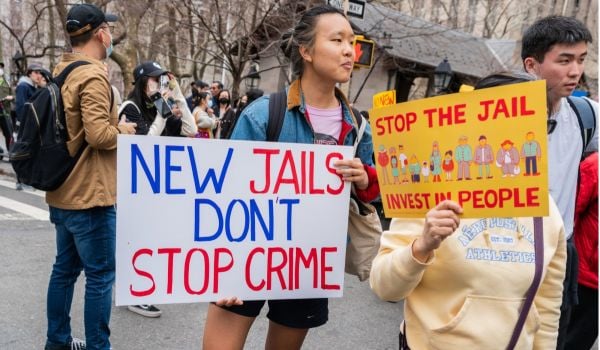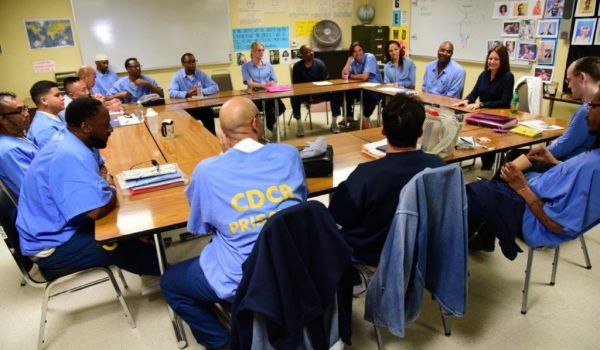When he was released from prison in 2013 more than a decade after being wrongfully convicted for criminal homicide, Brian Ferguson confronted a challenge faced by thousands of inmates each year who return to their communities after a period of incarceration.
Nearly penniless, lacking an employment history, and having missed the digital revolution while locked inside a 6-by-8-foot jail cell, Ferguson found himself without many of the skills he needed to succeed on the outside and at a loss for how to begin to acquire them.
Ferguson was a sophomore at West Virginia University with his eyes on law school when he was arrested in 2002 on suspicion of murdering a romantic rival. He was convicted by a jury based entirely on circumstantial evidence, and at the age of 21 began serving a sentence of life without parole. His conviction was overturned after a lengthy appeal on the grounds that his attorney failed to follow up on credible information that the crime was committed by someone else.
Although he reentered society vindicated of any wrongdoing and had the benefit of strong family support, Ferguson says identifying the resources he needed to put his life back on track was an exercise in frustration. Even his reentry counselor — a dedicated professional who was committed to his client’s success — seemed hamstrung by a lack of information.
“I was given a piece of paper with a bunch of names of groups that helped with education and classes and employment opportunities,” he says. “It was a single piece of paper, and it was so old the binder it came out of literally had dust on it. I’d say a third of the organizations that were on the list were either transitioning into something else or were no longer active at all.”

Brian Ferguson hopes to help formerly incarcerated people crowdsource successful reentry.
According to the National Institute of Justice, more than three-quarters of released prisoners are rearrested within five years. As Ferguson sees it, limiting recidivism is less about incentivizing prisoners to succeed than it is about giving them the tools to do so.
“People are self-motivated to find the things that are going to help them out and the things that are going to get them back on their feet,” he said. “People come home and they really want to change and want to make a life for themselves but the situation is such that they often have a difficult time finding the resources they need to do it.”
With that in mind, last summer Ferguson conceived “Angel’s List,” a web-based clearinghouse of information on reentry resources that he says has the potential to “completely revolutionize the service referral industry” for inmates reentering society after long prison terms.
In October, he was chosen as one of 10 fellows by Halcyon Incubator, a Washington, D.C.-based incubator program for social entrepreneurs.
For the next 14 months, Ferguson will live and work in the organization’s Georgetown headquarters, receiving professional and technical support as well as access to potential investors. If all goes according to plan, he will begin piloting Angel’s List in the D.C. area and New York City in 2016, before taking the platform national.
Prisoner advocates say reentry support is critical not only to the incarcerated men and women about to be released but also to their families and their communities.
“We need taxpayers and not tax burdens,” says Ann Schwartzman, executive director at the Pennsylvania Prison Society. “This means we need to make sure those returning to society can get decent jobs, have stable housing, and are able to reconnect with their loved ones.”
There are thousands of local, state and national programs across the U.S. designed to do just that, but most operate in a silo, focusing on individual needs like housing or employment training. Few are equipped to connect the dots to other essential services, and those that do often lack the capacity to adequately market their services. Fewer still provide the accessibility and scalability of a searchable online database.
At the national level, the Council of State Governments hosts a Reentry Resource Center that provides state-by-state links to information about a variety of programs for ex-offenders; most connect to static pages that are little more than online versions of the dusty binder that housed the paper Ferguson was given by his case manager.
That being said, models for what Ferguson has in mind do exist. For instance, Schwartzman’s group hosts a web-based resource where returning prisoners in the Philadelphia metropolitan area can search for a range of services — including education, employment, housing, and help for mental health and substance abuse issues.
The Philadelphia Reentry Network (PRN) debuted in July 2013 with support from the Philadelphia Department of Behavioral Health and Intellectual Disability Services. According to the site’s coordinator, Scott Sigman, it is the first of its kind in the state, and has the potential to be a national prototype. It was built by Trilogy Integrated Resources, a Bay Area technology company that maintains similar databases for three other counties, two in California and one in Texas.
What Ferguson envisions, however, is something even bigger. The name Angel’s List is a nod to “Angie’s List,” which relies on crowdsourced reviews to rank local businesses and is one of the oldest searchable consumer databases on the Internet. He also points to the online rating service Yelp as an inspiration.
Ferguson would like to see Angel’s List serve a similar function, combining user ratings, filtering and geolocation technology to help returning prisoners identify quality programs close to home in real time. His end goal is not only to help individual inmates enjoy better outcomes when they leave prison, but to invigorate an entire segment of the social services industry.
“Hopefully this will create a new competitive space for these organizations,” he said. “It’s a win-win because it allows people to have an input into their own success but it also facilitates the whole industry getting better.”
Christopher Moraff writes on politics, civil liberties and criminal justice policy for a number of media outlets. He is a reporting fellow at John Jay College of Criminal Justice and a frequent contributor to Next City and The Daily Beast.
Follow Christopher .(JavaScript must be enabled to view this email address)














